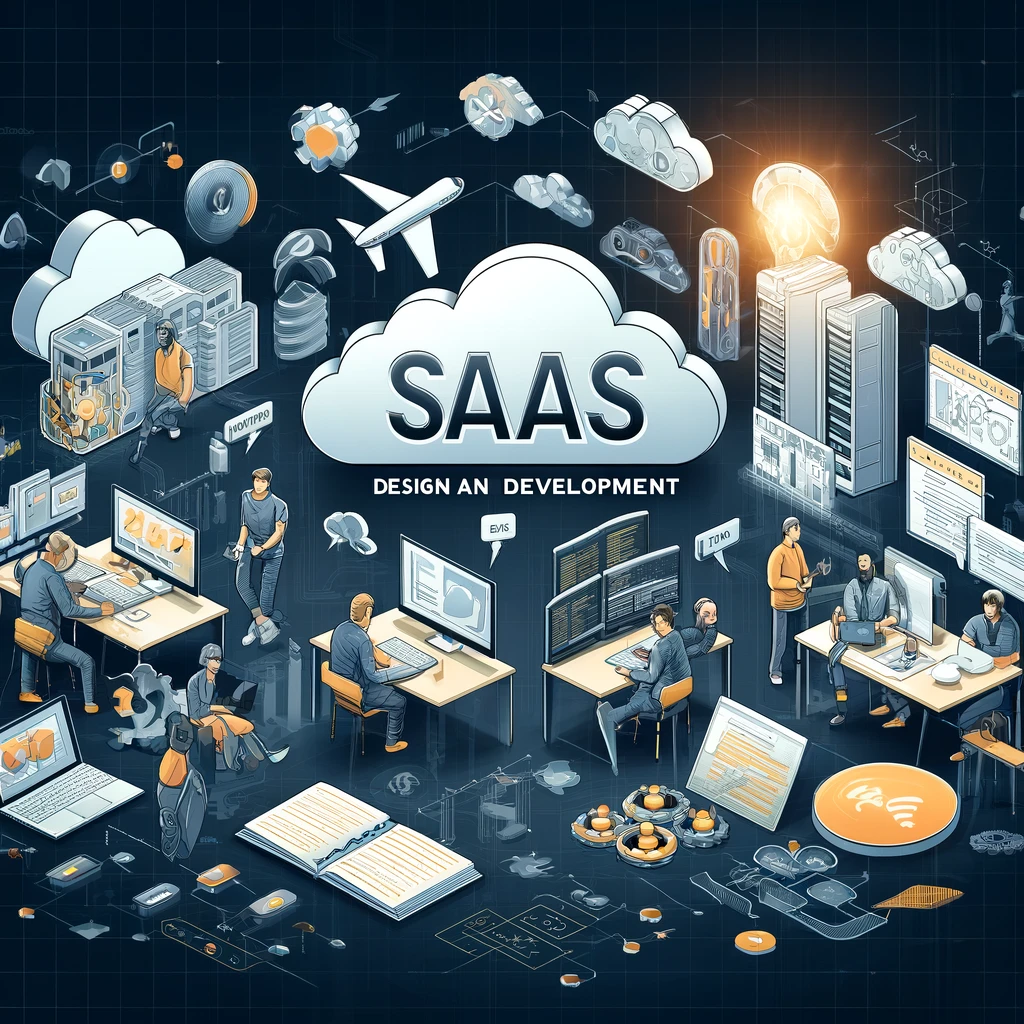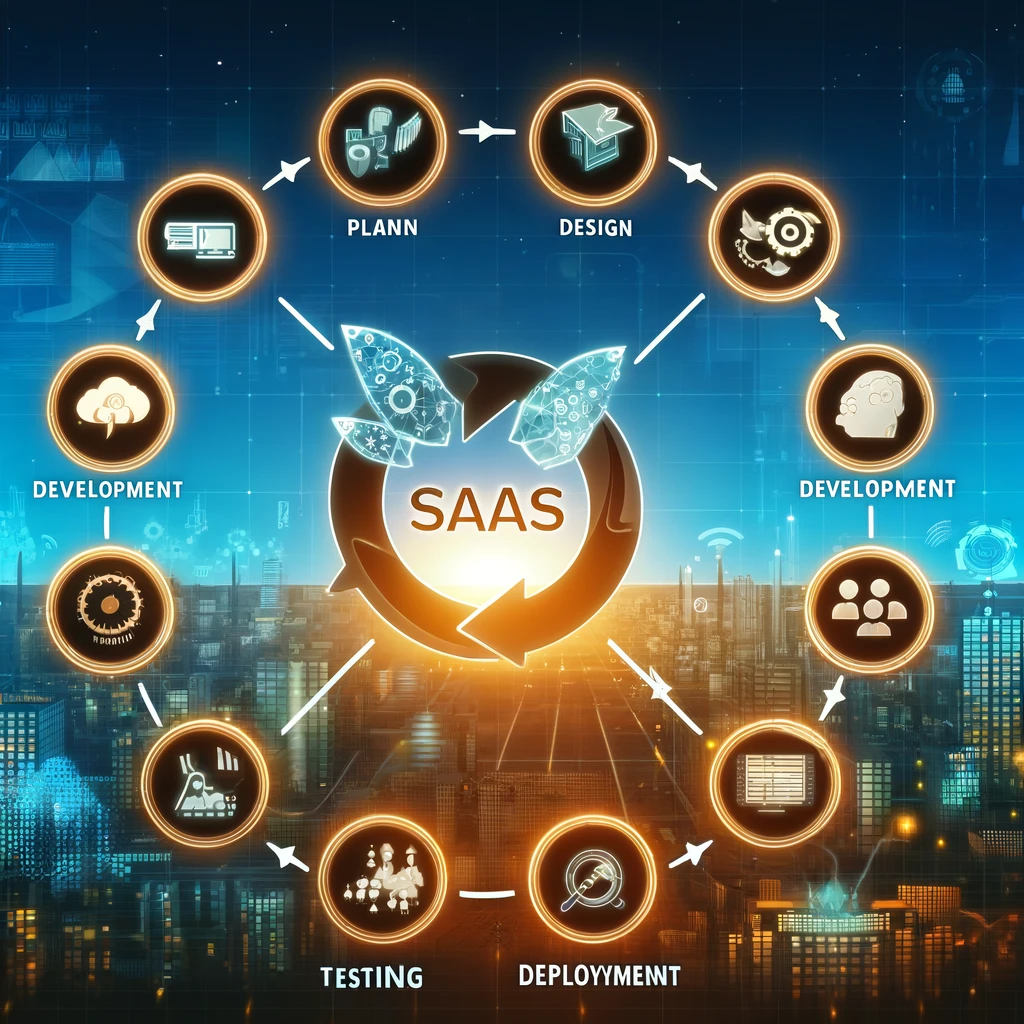- Learn with enJerneering SaaS Design & Development
Understanding SaaS: The Future of Software
Software as a Service (SaaS) is transforming how businesses deliver software solutions. Instead of traditional on-premises software installations, SaaS provides cloud-based applications that are accessible from anywhere in the world as long as you have an internet connection. This model offers numerous benefits, including reduced costs, scalability, and ease of updates. Let’s take a look at the key principles of SaaS design, the development lifecycle, and how our team at enJerneering can support you to Innovate Beyond™ with your SaaS development needs.

Key Principles of SaaS Design
In order to find success when using or designing SaaS applications, it’s important to understand the key principles of its design. Keep reading to discover how SaaS applications can benefit your business with their user-centric design and scalability potential.
User-Centric Design
User-centric design is at the heart of all successful SaaS products. Focusing on user needs and experiences ensures that your software is not only functional but also intuitive and enjoyable to use. Whether you are creating SaaS for internal or external use, your users should always be your top priority.
Key Practices:
- User Research: Conduct thorough user research to understand your target audience, their needs, and current pain points.
- Personas: Develop detailed user personas to guide design decisions and create tailored user experiences. Make sure you create multiple personas for this to be a success, as most companies have a wide range of customer personalities and user habits.
- Usability Testing: Regularly conduct usability tests to gather feedback and make necessary adjustments to your design.
Scalability and Performance
As your business grows and expands, you want your SaaS applications to do so with you. Scalability and performance are crucial for successful SaaS applications, which must handle growing user bases and data volumes without compromising performance.
Best Practices for Scalability and Performance:
- Modular Architecture: Design a modular architecture that allows for easy scaling and maintenance as your business needs change.
- Load Balancing: Load balancing aims to distribute traffic evenly across servers, ensuring consistent performance.
- Caching: Use caching strategies to reduce server load and improve response times for your users.
Security and Compliance
When upgrading or changing anything in your workplace systems, security and compliance should be top priorities. SaaS applications often handle sensitive data, so implementing security and compliance procedures is critical.
Best Practices for Security and Compliance:
- Data Encryption: Use robust encryption methods to protect data in transit and at rest.
- Authentication and Authorization: Implement strong authentication and authorization mechanisms to control access.
- Regular Audits: Conduct regular security audits and vulnerability assessments to identify and address potential risks.
SaaS Development Lifecycle
In order for your SaaS development project to run smoothly, you need to work through each step of the development cycle. When working with our team, we’ll support you through every stage of the process, from planning to development.
Planning and Requirements Gathering
The first step for successful SaaS development is thorough planning and gathering your requirements. Define the project scope, objectives, and deliverables clearly so that our team can work alongside you to meet your goals.
Key Planning Activities:
- Stakeholder Interviews: Spend time talking to stakeholders to understand their vision, goals, and expectations.
- Requirement Documentation: Document all functional and non-functional requirements meticulously so that you can refer back to them at any point in the process.
- Feasibility Analysis: Conduct feasibility studies to assess technical, financial, and operational viability.
Design and Prototyping
In the design phase, create detailed blueprints of the SaaS application, including UI/UX designs, architecture diagrams, and data models. Remember, you can always come back and make changes as time goes on, but these act as a good starting point for the project.
Essential Design Tools:
- Wireframing Tools: Use tools like Figma or Sketch to create wireframes and interactive prototypes.
- Architecture Design: Develop architecture diagrams to visualize the system’s structure and components. You can use these to showcase the project to your team and give them a visual idea of the end results.
- Database Design: Design efficient database schemas to manage data effectively.
Development and Testing
Now that the planning stages are complete, it’s time to start developing and testing your project. Our team will focus on building the application based on the design specifications you’ve created. Continuous testing ensures that the application meets quality standards.
Best Practices for Development and Testing:
- Agile Methodology: Adopt Agile practices to enable iterative development and continuous feedback. Agile focuses on continuous improvement and is essential for success in any project.
- Automated Testing: Implement automated testing for unit, integration, and end-to-end tests. This will help to continually find bugs and resolve them before deployment.
- Continuous Integration/Continuous Deployment (CI/CD): Use CI/CD pipelines to streamline code integration and deployment processes.
Deployment and Maintenance
After development and testing, deploy the application to a production environment. Ongoing maintenance ensures the application remains functional and up-to-date. Ensure you are receiving feedback from your team or customers throughout the lifespan of the application to offer the best results year after year.
Key Considerations for Deployment and Maintenance:
- Cloud Hosting: Choose reliable cloud hosting providers like AWS, Azure, or Google Cloud to reduce potential downtime or issues with your application.
- Monitoring: Implement monitoring tools to track application performance and detect issues. Act on any issues or performance feedback immediately.
- Support and Updates: Provide regular updates and technical support to address user concerns and improve the application.

Essential Tools for SaaS Development
There are many tools our team uses and recommends to anyone investing in SaaS development. These tools can support you in all of the stages we’ve shared above to improve the development of your application.
Development Frameworks
In order for your project to be a success, choose robust development frameworks that support rapid development and scalability as your business expands.
Popular Tech Stack Options:
- Backend: Node.js, .NET, Django (Python), Ruby on Rails, Spring Boot (Java)
- Frontend: Next.js, React, Svelte, Vue.js, Angular
DevOps and CI/CD Tools
Our team can implement DevOps practices and CI/CD tools to automate and streamline development processes when working together.
Recommended Tools:
- CI/CD: GitHub CI/CD, GitLab CI, CircleCI
- Containerization: Docker, Kubernetes
- Monitoring: Prometheus, Grafana
Additional Tools:
- Configuration Management: Ansible, Puppet, Chef
- Version Control: GitHub, Git, Bitbucket
- Infrastructure as Code: Terraform, AWS CloudFormation
- Continuous Testing: Selenium, JUnit, Jest
API Management
APIs are crucial for integrating various services and enabling third-party interactions. This can help you to maximize the benefits of SaaS applications within your business.
Top API Management Tools:
- API Gateway: AWS API Gateway, Apigee
- Documentation: Swagger, Postman
enJerneering's Expertise in SaaS Development
We specialize in designing and developing scalable, secure, and user-friendly SaaS solutions. Every aspect of your SaaS application is optimized for performance and user satisfaction. During every project we work on, we strive to Innovate Beyond™ and encourage your company to consider solutions that will help you to stand out from your competition.
Our SaaS Development Process
Our expert team will be here to support you during every step of the development process. Here are the steps we take to ensure successful and on-time delivery of our projects:
- Discovery and Planning: We begin with a detailed discovery phase to understand your vision and requirements. Our team will take time to get to know your business and the goals of working together.
- Design and Prototyping: Our design team creates intuitive and engaging user interfaces, focusing on delivering exceptional user experience.
- Development and Testing: Our developers build robust, scalable applications using the latest technologies and best practices. We conduct thorough testing both internally and with your team to ensure you are satisfied with the end results.
- Deployment and Maintenance: We deploy your application to a reliable cloud environment and provide ongoing maintenance and support. If you need further upgrades in the future, we’ll be here to support you in meeting the ever-changing needs of your business.
Why Choose enJerneering?
There are many reasons to consider working with our team:
- Expert Team: Our team is comprised of experienced professionals skilled in all aspects of SaaS development.
- Customer-Centric Approach: We prioritize your business goals and user needs in every project.
- Cutting-Edge Technology: We leverage the latest technologies and tools to deliver innovative solutions.
Conclusion
SaaS design and development is a complex process that requires careful planning, execution, and continuous improvement. By focusing on user-centric design, scalability, security, and leveraging essential tools, our team can help you create successful SaaS products for your employees or customers. At enJerneering, we are dedicated to helping you Innovate Beyond™ and achieve your SaaS goals. Contact us today to learn more about how we can support you or to discuss any questions you have about SaaS.
Categories of Services
enJerneering has deep expertise that can help you Innovate Beyond™ the competition. Our core competencies include: